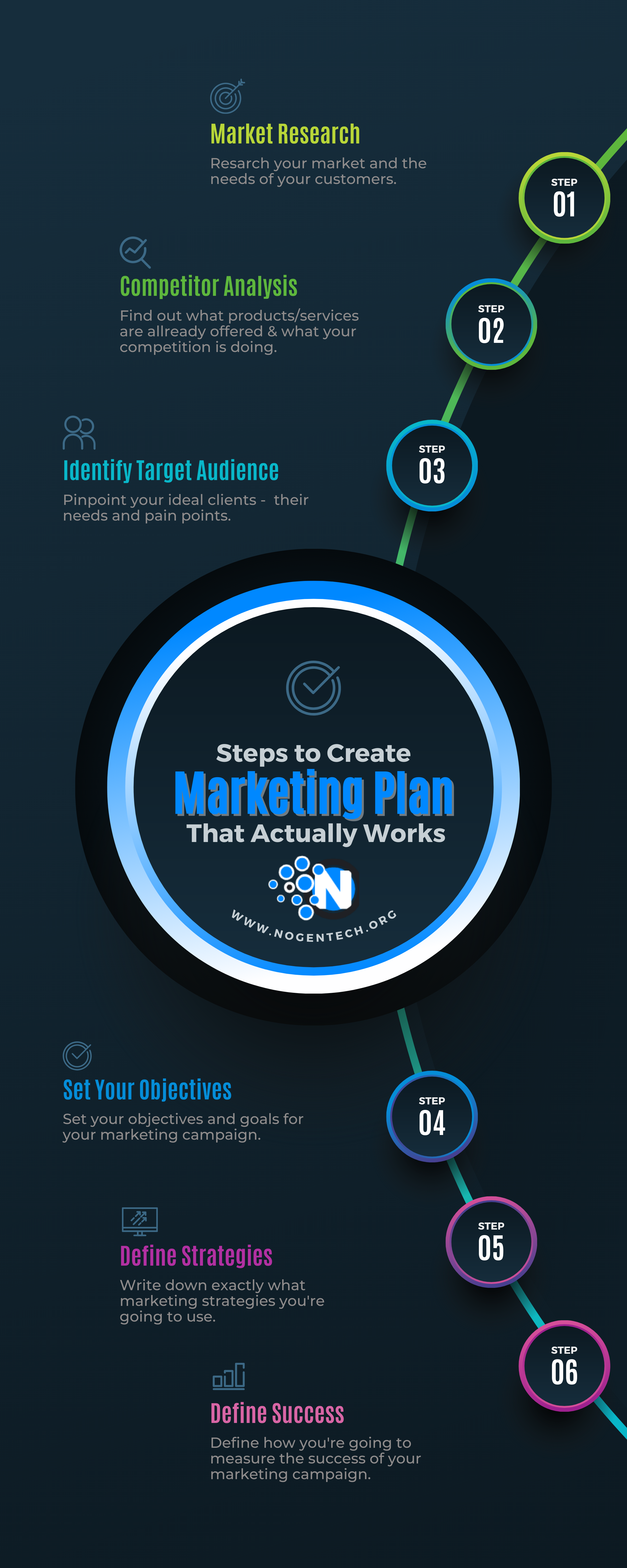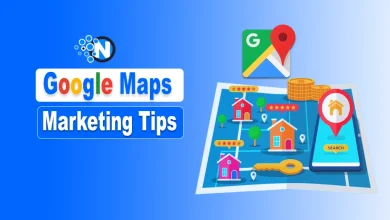6 Steps To Create a Marketing Plan That Actually Works

Are you looking to create a successful marketing plan to get your business noticed?
With the right strategy, it is possible, but it takes effort, research, and planning.
If done correctly, a good marketing plan can set you up for success in reaching both current and potential customers.
In this blog post, I have listed some essential steps to help you develop an effective marketing plan that fulfils your objectives.
Let’s start here!
What is a Marketing Plan, and Why is it Important?
A document that outlines the strategies and tactics a business will use to promote its products or services is known as a marketing plan.
A well-crafted marketing plan is essential to building a successful business. It allows companies to allocate resources effectively, identify their target audience, and communicate their message effectively.
Without a marketing plan, businesses risk wasting time, money, and resources on ineffective strategies. A good plan establishes a clear path to success and helps businesses stay focused on their goals.
Whether you’re a small business owner or the head of a large corporation, having a marketing plan in place is essential to achieving your marketing objectives and staying competitive in this ever-changing marketplace.

6 Steps To Create a Great Marketing Plan
Below are some proven steps to help you develop an effective marketing plan that fulfils your objectives and goals:
1. Market Research
Market research is the backbone of any successful marketing plan. It involves gathering information about the target market and consumers better to understand their needs, preferences, and behavior patterns.
In this highly competitive business world, market research is more important than ever to gain a competitive edge. With the help of advanced research techniques, businesses can collect insightful data and use it to make informed decisions about their products and services.
By understanding what customers want and need, businesses can tailor their offerings to meet those demands, ultimately leading to higher customer satisfaction, loyalty, and profitability. So, whether you’re just starting out or looking to grow your business, conducting thorough market research should be on your to-do list.
2. Competitor Analysis
As businesses compete to win customers in a crowded marketplace, solid marketing plans can make all the difference. A key element of any successful marketing plan is competitor analysis, which involves identifying and evaluating the strengths and weaknesses of opponent companies.
By understanding what sets competitors apart, businesses can tailor their own marketing strategies to better appeal to target customers. From analyzing product offerings and pricing structures to studying branding and messaging, competitor analysis offers invaluable insights that can inform every aspect of a company’s marketing plan.
By keeping a close eye on the competition, businesses can stay ahead of the curve and position themselves to succeed in today’s rapidly evolving marketplace.
3. Identify the Target Audience
When it comes to identifying your target audience, it is important to understand who you want to reach with your message or product. Is it a specific age group, gender, or interest group?
Maybe it’s a combination of several factors. Knowing your target audience will help you personalize your message to them and create content that resonates with their needs.
By understanding your target audience’s wants and needs, you can personalize your marketing materials. This will ultimately lead to better engagement and increased success for your business or message.
4. Set Your Marketing Objectives
To develop an effective marketing strategy, it is important to establish clear and specific marketing objectives. Without well-defined objectives, it is not easy to measure the success of your campaign or make adjustments as needed.
When setting your marketing objectives, start by identifying what you hope to achieve with your campaign, whether it’s increasing brand awareness, generating leads or driving sales. From there, ensure your objectives are measurable and realistic, and set timelines for achieving them.
By setting clear marketing objectives from the outset, you can focus your efforts and ensure you’re on track to achieve the desired results.
5. Define Marketing Strategies
Marketing strategies are the key components of a successful plan helping brands reach their target audience with the right message at the right time. They are a set of tactics and techniques designed to attract and retain customers, build brand visibility, and increase profits.
In today’s dynamic business environment, companies must stay ahead of their competition by developing effective marketing strategies catering to their target audience’s needs, interests, and preferences. Successful marketing strategies vary from company to company, but they all share a common goal – to increase ROI and market share.
Whether launching a new product, repositioning your brand, or expanding your reach, understanding your target audience and creating a well-defined marketing strategy are vital to your success.

Some basic marketing strategies may include:
Content marketing: Creating and distributing relevant and valuable content to attract and retain the target audience’s attention and drive profitable customer action.
Social media marketing: Utilizing social media platforms to build brand awareness, engage with the target audience, and drive website traffic.
Search engine optimization: Optimizing the website and content for search engines to improve organic search rankings and increase website traffic.
Email marketing: Using email to nurture and convert leads, retain customers, and promote new products or services.
Pay-per-click (PPC) advertising: Utilizing targeted ads on search engines and social media platforms to reach the target audience and drive website traffic.
Public relations (PR): Utilizing media relations and other tactics to build brand reputation, generate positive media coverage, and increase brand visibility.
Event marketing: Hosting or participating in events to promote the brand and engage with the target audience in person.
Referral marketing: Encouraging and incentivizing existing customers to refer new customers to the business.
6. Define Success for Your Marketing Plan
Success for a marketing plan can be defined in various ways depending on the company’s objectives. For some, it may be the number of leads generated or the increase in brand recognition. While the ultimate goal may be the actual sales generated from the campaign.
Whatever the objective may be, it’s crucial to have a clear definition of success before starting a marketing plan. This will help measure the campaign’s effectiveness along the way and make necessary changes to improve the outcome.
Final Words
A marketing plan is an essential and valuable tool for businesses of all sizes. With careful preparation and execution, it can help them to achieve their goals. A well-researched marketing plan starts with market research to understand the industry and competition, then analyzes the target audience and identifies objectives.
After that, it outlines the strategies necessary to reach those goals, culminating in defining success criteria. With a solid understanding of your own market position and that of your rivals, companies can leverage opportunities while mitigating threats on their way to realizing their objectives.




